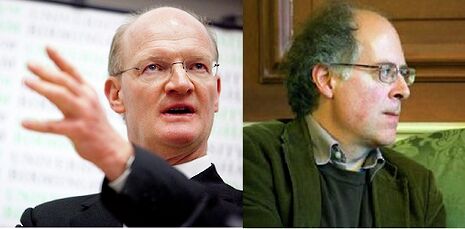Caius fellow among academics opposing government plans for open access research
Willetts’ proposal would allow anyone to read publicly funded research in journals for free, but the plan has been condemned as a threat to ‘academic freedoms’
Proposals by universities minister David Willetts to shift publicly funded research to an “open access” model by 2014 have been condemned by academic groups, including a prominent Cambridge academic.

Willetts’ new plans will see universities, not readers, pay for articles to be published in journals. This will allow anyone to read publicly funded research for free but also means the decision on whether and where to publish new research will lie with senior managers rather than academics themselves.
The Royal Historical Society, the Political Studies Association and the Council for the Defence of British Universities, whose members include Sir David Attenborough, Richard Dawkins and Alan Bennett, have joined forces to oppose the plans.
Peter Mandler, president of the Royal Historical Society and a professor of modern cultural history at Gonville and Caius College, has penned an open letter to the government, signed by 11 other organisations, in which he describes the plans as “a threat to academic freedom”.
Professor Mandler told The Guardian “The way peer review works is that you submit your work to anonymous assessors who are specialists in your field and they make their judgment on whether it will be published.”
"If you do it inside your university it is not anonymous, it follows a chain of command and is subject to all sorts of political considerations. Then the killer is that there is a dramatically growing gap between the senior management at most universities and their working academics.”
"Senior managers, even if they were once academics, now seem to be following a completely different agenda very much set by government policy. They are running large businesses.”
Speaking to Varsity about the implications of the report, Professor Mandler explained, “Most if not all academics are in favour of open access. But you can’t get something for nothing. Someone has to pay for the research and for its publication.”
“The current government plans give limited funding to universities to pay for the publication of academic work, so that it can then be made free to readers. But that will mean that university administrations decide which of their academics can publish, what they publish, and where. That’s going to inhibit creativity and freedom.”
Professor Mandler insists that “the real question” is how to develop an open access plan that protects academic freedom, and also ensures that the editorial and publication work performed by journals continues in an affordable and sustainable way.
Harry Wright, a second year English student at Gonville and Caius, agreed with Professor Mandler’s statement. “I worry that these reforms will result in an environment where academics must compete for the same two or three spaces, not to mention the political implications of universities picking and choosing ‘suitable’ academics and research, depending on the educational climate of the day.”
“Access is something that must be handled with greater care.”
The Department for Business, Innovation and Skills told The Guardian, "Such an important change was always going to raise questions of implementation. David Willetts will be giving an update to parliament next week. The academic publishing world is changing fast all over the world and it is essential that the interests of UK researchers, publishers and taxpayers are all taken into account as that change occurs."
 Comment / Plastic pubs: the problem with Cambridge alehouses 5 January 2026
Comment / Plastic pubs: the problem with Cambridge alehouses 5 January 2026 News / Cambridge businesses concerned infrastructure delays will hurt growth5 January 2026
News / Cambridge businesses concerned infrastructure delays will hurt growth5 January 2026 News / Cambridge academics stand out in King’s 2026 Honours List2 January 2026
News / Cambridge academics stand out in King’s 2026 Honours List2 January 2026 News / AstraZeneca sues for £32 million over faulty construction at Cambridge Campus31 December 2025
News / AstraZeneca sues for £32 million over faulty construction at Cambridge Campus31 December 2025 Interviews / You don’t need to peak at Cambridge, says Robin Harding31 December 2025
Interviews / You don’t need to peak at Cambridge, says Robin Harding31 December 2025









